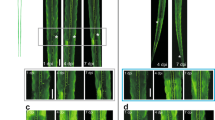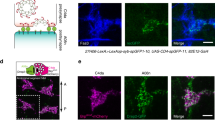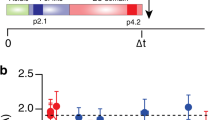Abstract
When the central nervous system (CNS) develops, neurones send out axons to make contact with appropriate synaptic target cells and then stop growing. If its usual target is missing, an axon may continue to grow until it synapses with a suitable but inappropriate target1. This suggests that contact with a synaptic target is important in stopping axonal growth during development. Many classes of neurone in the adult CNS retain a capacity to grow towards denervated targets2–5, but it is not known whether the synaptic contacts established during development continue to regulate the growth of individual mature, intact axons. This has been a difficult problem to investigate; in vertebrates most studies necessarily involve large populations of neurones, and the most direct approach, removal of a synaptic target, usually damages many neurones, including the axons that are to be studied. We report here a demonstration of target cell influences on the growth of a single mature, intact axon in the CNS of the leech by selectively destroying the axon's synaptic target without injuring the axon itself. Target removal, which itself does not trigger sprouting of intact axons, permits the intact axon to grow at its tip in response to injury of other axonal branches of the same cell.
This is a preview of subscription content, access via your institution
Access options
Subscribe to this journal
Receive 51 print issues and online access
$199.00 per year
only $3.90 per issue
Buy this article
- Purchase on Springer Link
- Instant access to full article PDF
Prices may be subject to local taxes which are calculated during checkout
Similar content being viewed by others
References
Schneider, G. E. & Jhaveri, S. R. in Plasticity and Recovery of Function in the Central Nervous System (eds Stein, D., Rosen, J. & Butters, N.) 65–109 (Academic, New York, 1974).
Gaze, R. M. The Formation of Nerve Connections (Academic, New York, 1970).
Cotman, C. W. & Lynch, G. S. in Neuronal Recognition (ed. Barondes, S. H.) 69–108 (Plenum, New York, 1976).
Björklund, A. & Stenevi, U. Physiol. Rev. 59, 62–100 (1979).
Muller, K. J. Biol. Rev. 54, 99–134 (1979).
Frank, E., Jansen, J. K. S. & Rinvik, E. J. comp. Neurol. 159, 1–13 (1975).
Carbonetto, S. & Muller, K. J. Nature 267, 450–452 (1977).
Muller, K. J. & Carbonetto, S. T. J. comp. Neurol. 185, 485–516 (1979).
Bowling, D., Nicholls, J. & Parnas, I. J. Physiol., Lond. 282, 169–180 (1978).
Muller, K. J. & Scott, S. A. Science 206, 87–89 (1979).
Stewart, W. W. Cell 14, 741–759 (1978).
Bunge, M. B. J. Neurocytol. 6, 407–439 (1977).
Muller, K. J. & McMahan, U. J. Proc. R. Soc. B194, 481–499 (1976).
Fernández, J. H. & Fernández, M. S. G. Nature 251, 428–430 (1974).
Author information
Authors and Affiliations
Rights and permissions
About this article
Cite this article
Muller, K., Scott, S. Removal of the synaptic target permits terminal sprouting of a mature intact axon. Nature 283, 89–90 (1980). https://doi.org/10.1038/283089a0
Received:
Accepted:
Issue Date:
DOI: https://doi.org/10.1038/283089a0
This article is cited by
-
Isolation of microglia-derived extracellular vesicles: towards miRNA signatures and neuroprotection
Journal of Nanobiotechnology (2019)
-
Lucifer dyes—highly fluorescent dyes for biological tracing
Nature (1981)
Comments
By submitting a comment you agree to abide by our Terms and Community Guidelines. If you find something abusive or that does not comply with our terms or guidelines please flag it as inappropriate.



